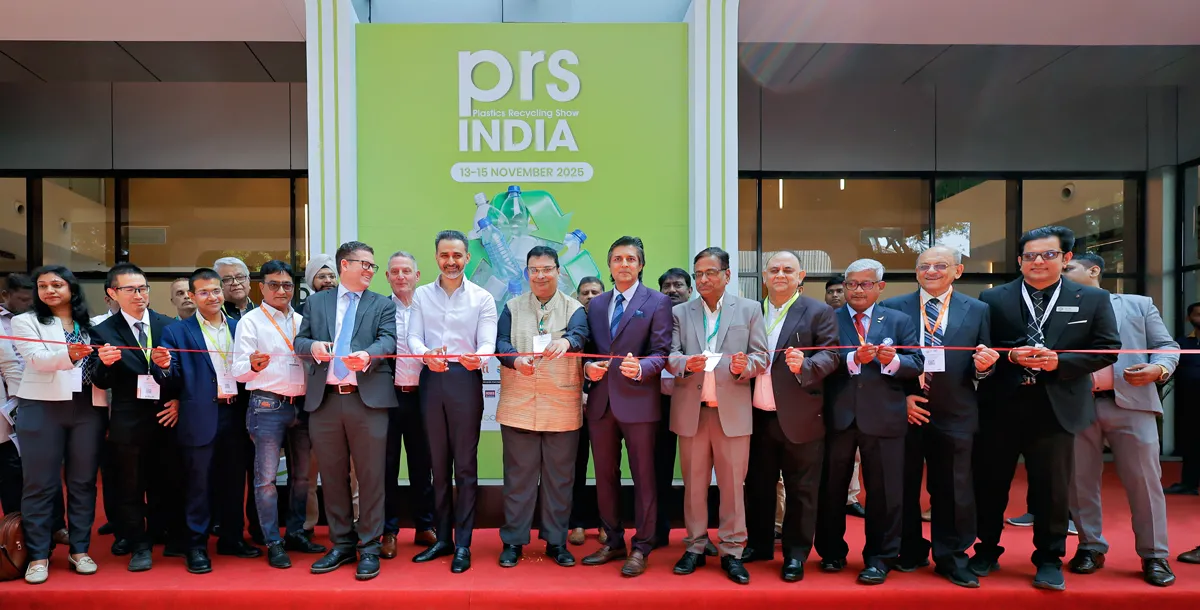The second edition of UTECH India – Sustainable Polyurethane & Foam (ISPUF) Expo 2025 has commenced at the Bombay Exhibition Centre, NESCO, Mumbai. Building on the success of its debut edition, the event showcases advanced polyurethane (PU), foam and insulation technologies aimed at supporting India’s shift towards high-performance and sustainable materials. Organised by Media Fusion and Crain Communications, the expo runs from 13–15 November 2025.
India’s PU and foam market continues to expand rapidly. The polyurethane foam market, valued at USD 4.0 billion in 2024, is projected to reach USD 7.1 billion by 2033, driven by rising demand in the construction, automotive, furniture, bedding and appliance sectors. The sandwich panel market is expected to grow at over 10 per cent CAGR through 2030, while the thermal insulation market is set to exceed USD 1.8 billion by 2027.
The event’s inauguration featured several industry leaders, including Mr Sanjay Gupta, President, Indian Footwear Component Manufacturers Association; Mr Ketan Sheth, President, IIID-MRC; Mr Jaiprakash Bhatia, Chairman, Builders Association of India; and representatives from AFMT, Jayant Agro-Organics, Isha Textiles, Starlon and Chemie Products. Their participation underscored the growing role of PU and foam in sustainable construction, mobility and comfort solutions.
UTECH India highlights the rising adoption of energy-efficient materials, supported by initiatives such as the Energy Conservation Building Code (ECBC), Smart Cities Mission and India’s net-zero 2070 commitment. PU sandwich panels, capable of delivering up to 40 per cent energy savings, are increasingly being used in infrastructure, real estate and cold-chain projects.
Abasaheb Kale, Managing Director, pdkASM Consulting, emphasized the shifting landscape, stating, “The increasing emphasis on dry and fast construction methods is reshaping India’s infrastructure landscape. With the government mandating 25 per cent prefabricated components in upcoming projects, metal sandwich panels have emerged as a key solution to meet the need for speed, sustainability, and thermal comfort. While these panels have long been used effectively in cold chains and industrial facilities, their adoption in commercial and residential buildings remains limited. Given rising ambient temperatures and growing concerns about energy and water consumption, it is crucial to embrace sustainable dry construction technologies.”
Matthew Barber, Global Events Director, Crain Communications, said “UTECH India 2025 continues to serve as a catalyst for collaboration, innovation, and knowledge exchange, aligning with India’s national priorities of sustainability, energy conservation, and industrial growth. The event not only showcases the latest advancements in polyurethane and foam technologies but also fosters meaningful dialogue among global and domestic stakeholders to accelerate the adoption of sustainable manufacturing practices. As part of the global UTECH series, the India edition plays a pivotal role in connecting international expertise with local opportunities, reinforcing India’s growing prominence in the global polyurethane and foam value chain.”
Day 1 included sessions on bio-polyols for flexible PU foam manufacturing, spray-applied PU insulation, digitalisation in PU factories, castor oil-based PU applications and the impact of U.S. tariffs on India’s footwear supply chain. Discussions on recyclability, circular economy approaches and the market readiness of bio-based polyurethanes further highlighted the sector’s sustainability focus.
Day 2 will explore bio-based PU foams for energy applications, next-generation pharma infrastructure, disaster-resilient sandwich panels and sustainable cold storage design. Case studies will examine eco-friendly PU systems, EPS-cement panels, metal and non-metal fire-safe insulation cores. The day will conclude with the PU Champions felicitation ceremony.
Day 3 will feature technical sessions on foam equipment selection, flexible slabstock foams, and sustainable PU formulation strategies using cutting waste and dust from block and roller production. The expo will also host a final felicitation for PU Champions, acknowledging industry contributions.
UTECH India 2025 offers a comprehensive view of India’s PU and foam ecosystem, bringing together manufacturers, innovators, researchers and policymakers to explore new technologies, business opportunities and sustainable pathways for the industry’s future.





















